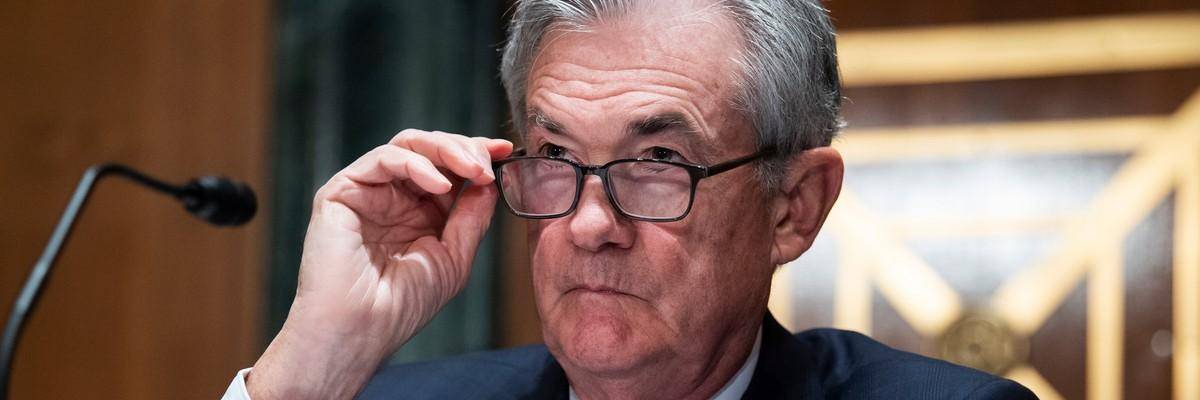

SUBSCRIBE TO OUR FREE NEWSLETTER
Daily news & progressive opinion—funded by the people, not the corporations—delivered straight to your inbox.
5
#000000
#FFFFFF
To donate by check, phone, or other method, see our More Ways to Give page.


Daily news & progressive opinion—funded by the people, not the corporations—delivered straight to your inbox.

Federal Reserve Chairman Jerome Powell testifies during a Senate hearing on July 15, 2021. (Photo: Tom Williams/CQ-Roll Call, Inc. via Getty Images)
Yesterday's data showing negative gross domestic product (GDP) growth for the second consecutive quarter has sparked a debate about whether the U.S. economy is in recession. Below are some quick thoughts interpreting the numbers, and some larger questions about recession and inflation.
A recession in the coming months would be exceptionally troubling. It would largely result from a policy mistake of too-rapid interest rate tightening by the Fed--one that could have been avoided. If a recession hits when inflation remains high--mostly driven by global developments in energy and food markets--the Fed might feel pressure to not cut rates in order to bleed remaining inflation out of the economy. This would be extremely damaging and threaten to prolong the recession.
Finally, if the wrong narrative--that today's inflation was driven by too-generous fiscal relief--takes hold, it could make it even harder for Congress to undertake necessary recovery measures. In short, the inflationary episode we're in could induce political hesitancy to address a future recession, and that could end up being inflation's greatest cost to U.S. households.
Dear Common Dreams reader, The U.S. is on a fast track to authoritarianism like nothing I've ever seen. Meanwhile, corporate news outlets are utterly capitulating to Trump, twisting their coverage to avoid drawing his ire while lining up to stuff cash in his pockets. That's why I believe that Common Dreams is doing the best and most consequential reporting that we've ever done. Our small but mighty team is a progressive reporting powerhouse, covering the news every day that the corporate media never will. Our mission has always been simple: To inform. To inspire. And to ignite change for the common good. Now here's the key piece that I want all our readers to understand: None of this would be possible without your financial support. That's not just some fundraising cliche. It's the absolute and literal truth. We don't accept corporate advertising and never will. We don't have a paywall because we don't think people should be blocked from critical news based on their ability to pay. Everything we do is funded by the donations of readers like you. Will you donate now to help power the nonprofit, independent reporting of Common Dreams? Thank you for being a vital member of our community. Together, we can keep independent journalism alive when it’s needed most. - Craig Brown, Co-founder |
Yesterday's data showing negative gross domestic product (GDP) growth for the second consecutive quarter has sparked a debate about whether the U.S. economy is in recession. Below are some quick thoughts interpreting the numbers, and some larger questions about recession and inflation.
A recession in the coming months would be exceptionally troubling. It would largely result from a policy mistake of too-rapid interest rate tightening by the Fed--one that could have been avoided. If a recession hits when inflation remains high--mostly driven by global developments in energy and food markets--the Fed might feel pressure to not cut rates in order to bleed remaining inflation out of the economy. This would be extremely damaging and threaten to prolong the recession.
Finally, if the wrong narrative--that today's inflation was driven by too-generous fiscal relief--takes hold, it could make it even harder for Congress to undertake necessary recovery measures. In short, the inflationary episode we're in could induce political hesitancy to address a future recession, and that could end up being inflation's greatest cost to U.S. households.
Yesterday's data showing negative gross domestic product (GDP) growth for the second consecutive quarter has sparked a debate about whether the U.S. economy is in recession. Below are some quick thoughts interpreting the numbers, and some larger questions about recession and inflation.
A recession in the coming months would be exceptionally troubling. It would largely result from a policy mistake of too-rapid interest rate tightening by the Fed--one that could have been avoided. If a recession hits when inflation remains high--mostly driven by global developments in energy and food markets--the Fed might feel pressure to not cut rates in order to bleed remaining inflation out of the economy. This would be extremely damaging and threaten to prolong the recession.
Finally, if the wrong narrative--that today's inflation was driven by too-generous fiscal relief--takes hold, it could make it even harder for Congress to undertake necessary recovery measures. In short, the inflationary episode we're in could induce political hesitancy to address a future recession, and that could end up being inflation's greatest cost to U.S. households.